Day Three
August 10th
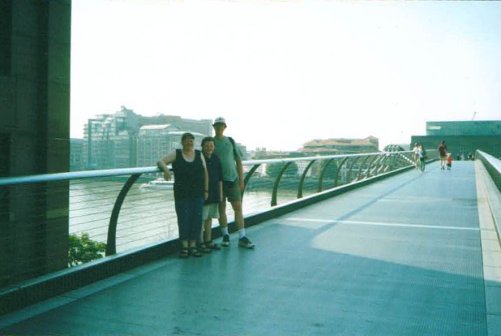 We
got up, ate our English breakfasts, and took the Tube to Blackfriars,
so called because of the black friars there at one time (surprisingly
enough). We crossed the Millenium
Bridge, commissioned from Norman Foster by Queen Elizabeth II. It
was the first new bridge to cross the Thames in more than a hundred
years. At its gala opening ceremony, so many people stood on it that
it started wobbling! They had to close it for expensive structural
re-engineering, but it re-opened in 2002.
We
got up, ate our English breakfasts, and took the Tube to Blackfriars,
so called because of the black friars there at one time (surprisingly
enough). We crossed the Millenium
Bridge, commissioned from Norman Foster by Queen Elizabeth II. It
was the first new bridge to cross the Thames in more than a hundred
years. At its gala opening ceremony, so many people stood on it that
it started wobbling! They had to close it for expensive structural
re-engineering, but it re-opened in 2002.
 The
Tate Modern Museum was
built like a warehouse, which is not surprising, given that it began
life as the Bankside Power Station. It was remodelled into a museum
for the millenium by the Swiss architects Herzog & De Meuron. The
floors are arranged by themes rather than chronologically, as befits
the increasingly scrambled, conceptual nature of modern art. The
themes are History/Memory/Society, Nude/Action/Body,
Landscape/Matter/Environment, and Still Life/Object/Real Life. At the
Tate Modern museum, we saw amazing works of art by: Henri Matisse,
Pablo Picasso, George Bracques, Pierre Bonnard, Eduard Vuillard,
Salvador Dali, Man Ray, Cornelia Parker, Paul Cezanne, Richard
Deacon, Claes Oldenburg, Robert Smithson, Piet Mondrian, Laszlo
Moholy-Nagy, Robert Therrien, Roy Lichtenstein, Naum Gabo, Andy
Warhol, Bridget Reilly, Frank Stella, Clyfford Stills, Alberto
Giacometti, Eric Gill, Cy Twombly, Arshile Gorky, Marcel Duchamp,
Mark Rothko, Anselm Kiefer, Joseph Beuys, Mark Dion, Bruce Nauman,
Jackson Pollock, Roni Horn, Blinky Palermo, Sonia Boyce, and Thomas
Struth... and one Monet!
The
Tate Modern Museum was
built like a warehouse, which is not surprising, given that it began
life as the Bankside Power Station. It was remodelled into a museum
for the millenium by the Swiss architects Herzog & De Meuron. The
floors are arranged by themes rather than chronologically, as befits
the increasingly scrambled, conceptual nature of modern art. The
themes are History/Memory/Society, Nude/Action/Body,
Landscape/Matter/Environment, and Still Life/Object/Real Life. At the
Tate Modern museum, we saw amazing works of art by: Henri Matisse,
Pablo Picasso, George Bracques, Pierre Bonnard, Eduard Vuillard,
Salvador Dali, Man Ray, Cornelia Parker, Paul Cezanne, Richard
Deacon, Claes Oldenburg, Robert Smithson, Piet Mondrian, Laszlo
Moholy-Nagy, Robert Therrien, Roy Lichtenstein, Naum Gabo, Andy
Warhol, Bridget Reilly, Frank Stella, Clyfford Stills, Alberto
Giacometti, Eric Gill, Cy Twombly, Arshile Gorky, Marcel Duchamp,
Mark Rothko, Anselm Kiefer, Joseph Beuys, Mark Dion, Bruce Nauman,
Jackson Pollock, Roni Horn, Blinky Palermo, Sonia Boyce, and Thomas
Struth... and one Monet!
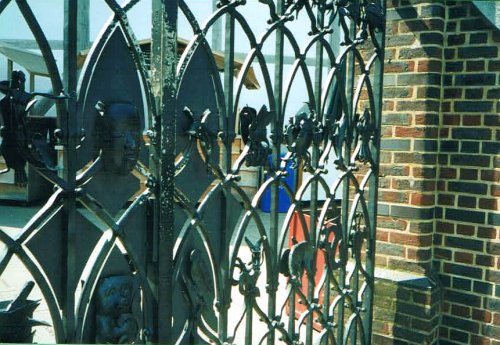 We
walked to Shakespeare's
Globe Theater and saw the reconstructed playhouse with its thatch
roof, timber-framed walls, and the fantastic new front gates. The
original Globe was built in 1599. It burned to the ground in 1613,
but it was immediately rebuilt, lasting until the Puritans, who
thought that theaters were sinful, closed it down in 1642. The
American actor and director Sam Wanamaker dedicated himself to
rebuilding the Globe Theater exactly as it was, completing the
project in 1997. The new theater has one important change, though:
the authentic thatch roof has an inauthentic sprinkler system to
prevent a repeat of 1613. Each symbol on the new gates represents one
of Shakespeare's plays. Unfortunately, our schedule did not permit us
to see a play there. However, we did watch “The Taming of the
Shrew” performed by the Royal Shakespeare Company in Stratford. We
also passed the house where Sir Christopher Wren lived.
We
walked to Shakespeare's
Globe Theater and saw the reconstructed playhouse with its thatch
roof, timber-framed walls, and the fantastic new front gates. The
original Globe was built in 1599. It burned to the ground in 1613,
but it was immediately rebuilt, lasting until the Puritans, who
thought that theaters were sinful, closed it down in 1642. The
American actor and director Sam Wanamaker dedicated himself to
rebuilding the Globe Theater exactly as it was, completing the
project in 1997. The new theater has one important change, though:
the authentic thatch roof has an inauthentic sprinkler system to
prevent a repeat of 1613. Each symbol on the new gates represents one
of Shakespeare's plays. Unfortunately, our schedule did not permit us
to see a play there. However, we did watch “The Taming of the
Shrew” performed by the Royal Shakespeare Company in Stratford. We
also passed the house where Sir Christopher Wren lived.
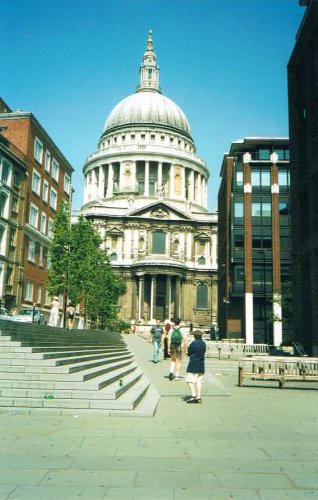 We
went back over the Millenium bridge to see St.
Paul's Cathedral, where the bird-lady in “Mary Poppins” sold
her wares. All around the cathedral the saints and apostles looked
down... at us! It was designed by Christopher Wren and built between
1675 and 1710. In size, it is second only to St. Peter's in Rome.
We
went back over the Millenium bridge to see St.
Paul's Cathedral, where the bird-lady in “Mary Poppins” sold
her wares. All around the cathedral the saints and apostles looked
down... at us! It was designed by Christopher Wren and built between
1675 and 1710. In size, it is second only to St. Peter's in Rome.
If the Smithsonian Museum is America's attic, then the Victoria
and Albert Museum is England's basement. Prince Albert left the
collection to the city after the Great Exhibition of 1851. At the
Victoria and Albert, we saw all sorts of stuff: European furniture
and sculpture; Islamic art, including an immense carpet; Chinese,
Japanese, and Korean objets d'art; some enormous cast plaster statues
and pillars; the British Galleries, which were delightfully
air-conditioned and full of furniture, paintings, and even entire
reproduced rooms; and tons of clothing and household goods. What an
unbelievable accumulation!
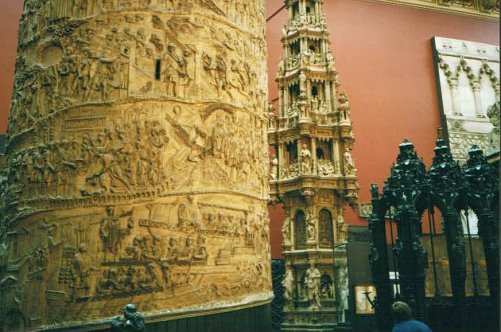 Eric
tried on a neck ruff, an Inverness cape, and a gauntlet that was
surprisingly comfortable. The costume section was very interesting.
There were dresses from the 19th and early 20th
centuries up to some pretty outlandish modern outfits.
Eric
tried on a neck ruff, an Inverness cape, and a gauntlet that was
surprisingly comfortable. The costume section was very interesting.
There were dresses from the 19th and early 20th
centuries up to some pretty outlandish modern outfits.
We also saw what may have been King Henry VIII's writing desk!
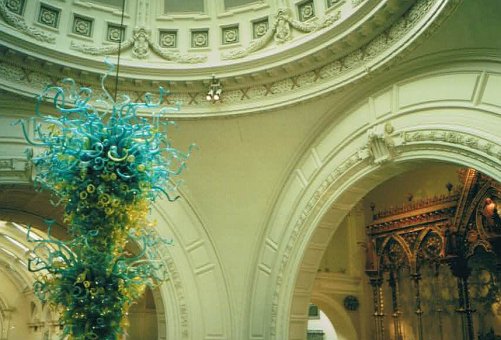 We
ate dinner at the Chimes Restaurant that night. We drank lemonade,
ginger beer, English perry, and this dandelion and burdock stuff, as
well as lots of “tap water.” “Water” in London means
sparkling water. You have to ask for “still” water to get the
flat kind. Heather and Eric had orange treacle tart for dessert.
We
ate dinner at the Chimes Restaurant that night. We drank lemonade,
ginger beer, English perry, and this dandelion and burdock stuff, as
well as lots of “tap water.” “Water” in London means
sparkling water. You have to ask for “still” water to get the
flat kind. Heather and Eric had orange treacle tart for dessert.
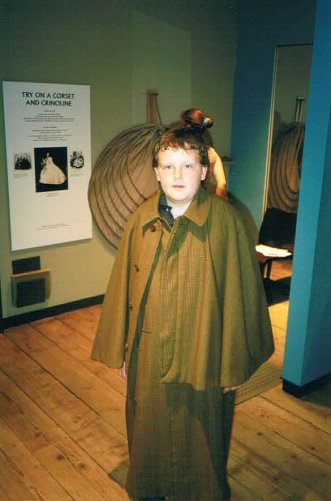
BACK
 We
got up, ate our English breakfasts, and took the Tube to Blackfriars,
so called because of the black friars there at one time (surprisingly
enough). We crossed the Millenium
Bridge, commissioned from Norman Foster by Queen Elizabeth II. It
was the first new bridge to cross the Thames in more than a hundred
years. At its gala opening ceremony, so many people stood on it that
it started wobbling! They had to close it for expensive structural
re-engineering, but it re-opened in 2002.
We
got up, ate our English breakfasts, and took the Tube to Blackfriars,
so called because of the black friars there at one time (surprisingly
enough). We crossed the Millenium
Bridge, commissioned from Norman Foster by Queen Elizabeth II. It
was the first new bridge to cross the Thames in more than a hundred
years. At its gala opening ceremony, so many people stood on it that
it started wobbling! They had to close it for expensive structural
re-engineering, but it re-opened in 2002. The
The
 We
walked to
We
walked to  We
went back over the Millenium bridge to see
We
went back over the Millenium bridge to see  Eric
tried on a neck ruff, an Inverness cape, and a gauntlet that was
surprisingly comfortable. The costume section was very interesting.
There were dresses from the 19th and early 20th
centuries up to some pretty outlandish modern outfits.
Eric
tried on a neck ruff, an Inverness cape, and a gauntlet that was
surprisingly comfortable. The costume section was very interesting.
There were dresses from the 19th and early 20th
centuries up to some pretty outlandish modern outfits. We
ate dinner at the Chimes Restaurant that night. We drank lemonade,
ginger beer, English perry, and this dandelion and burdock stuff, as
well as lots of “tap water.” “Water” in London means
sparkling water. You have to ask for “still” water to get the
flat kind. Heather and Eric had orange treacle tart for dessert.
We
ate dinner at the Chimes Restaurant that night. We drank lemonade,
ginger beer, English perry, and this dandelion and burdock stuff, as
well as lots of “tap water.” “Water” in London means
sparkling water. You have to ask for “still” water to get the
flat kind. Heather and Eric had orange treacle tart for dessert.